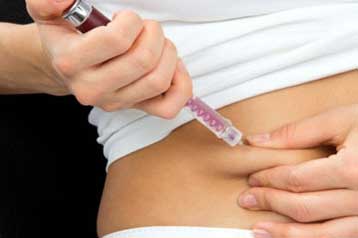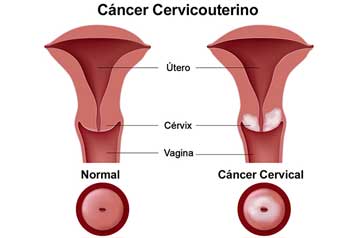Cervical Cancer Screening
Cervical cancer is the easiest female cancer to prevent, with regular screening tests and follow-up. Two screening tests can help prevent cervical cancer or find it early.
- The Pap test (or Pap smear) looks for precancers, cell changes on the cervix that might become cervical cancer if they are not treated appropriately.
- The HPV test looks for the virus (human papillomavirus) that can cause these cell changes.
The Pap test is recommended for all women, and can be done in a doctor's office or clinic. During the Pap test, the doctor will use a plastic or metal instrument, called a speculum, to widen your vagina. This helps the doctor examine the vagina and the cervix, and collect a few cells and mucus from the cervix and the area around it. The cells are then placed on a slide or in a bottle of liquid and sent to a laboratory. The laboratory will check to be sure that the cells are normal.
If you are getting the HPV test in addition to the Pap test, the cells collected during the Pap test will be tested for HPV at the laboratory. Talk with your doctor, nurse, or other health care professional about whether the HPV test is right for you.
When you have a Pap test, the doctor may also perform a pelvic exam, checking your uterus, ovaries, and other organs to make sure there are no problems. There are times when your doctor may perform a pelvic exam without giving you a Pap test. Ask your doctor which tests you are having, if you are unsure.
If you have a low income or do not have health insurance, you may be able to get a free or low-cost Pap test through the National Breast and Cervical Cancer Early Detection Program. Find out if you qualify.
When to Get Screened
You should start getting regular Pap tests at age 21, or within three years of the first time you have sex—whichever happens first. The Pap test, which screens for cervical cancer, is one of the most reliable and effective cancer screening tests available.
The only cancer for which the Pap test screens is cervical cancer. It does not screen for ovarian, uterine, vaginal, or vulvar cancers. So even if you have a Pap test regularly, if you notice any signs or symptoms that are unusual for you, see a doctor to find out why you're having them.
In addition to the Pap test—the main test for cervical cancer—the HPV test may also be used to screen women aged 30 years and older, or women of any age who have unclear Pap test results.
If you are 30 years old or older and your screening tests are normal, your chance of getting cervical cancer in the next few years is very low. For that reason, your doctor may tell you that you will not need another screening test for up to three years. But you should still go to the doctor regularly for a check-up that may include a pelvic exam.
It is important for you to continue getting a Pap test regularly—even if you think you are too old to have a child, or are not having sex anymore. If you are older than 65 and have had normal Pap test results for several years, or if you have had your cervix removed (during an operation called a hysterectomy), your doctor may tell you it is okay to stop getting regular Pap tests.
How to Prepare for Your Pap Test
You should not schedule your Pap test for a time when you are having your period. If you are going to have a Pap test in the next two days
You should not douche (rinse the vagina with water or another fluid).
- You should not use a tampon.
- You should not have sex.
- You should not use a birth control foam, cream, or jelly.
- You should not use a medicine or cream in your vagina.
Pap Test Results
It can take up to three weeks to receive your Pap test results. If your test shows that something might not be normal, your doctor will contact you and figure out how best to follow up. There are many reasons why Pap test results might not be normal. It usually does not mean you have cancer.
If your Pap test results show cells that are not normal and may become cancer, your doctor will let you know if you need to be treated. In most cases, treatment prevents cervical cancer from developing. It is important to follow up with your doctor right away to learn more about your test results and receive any treatment that may be needed.






